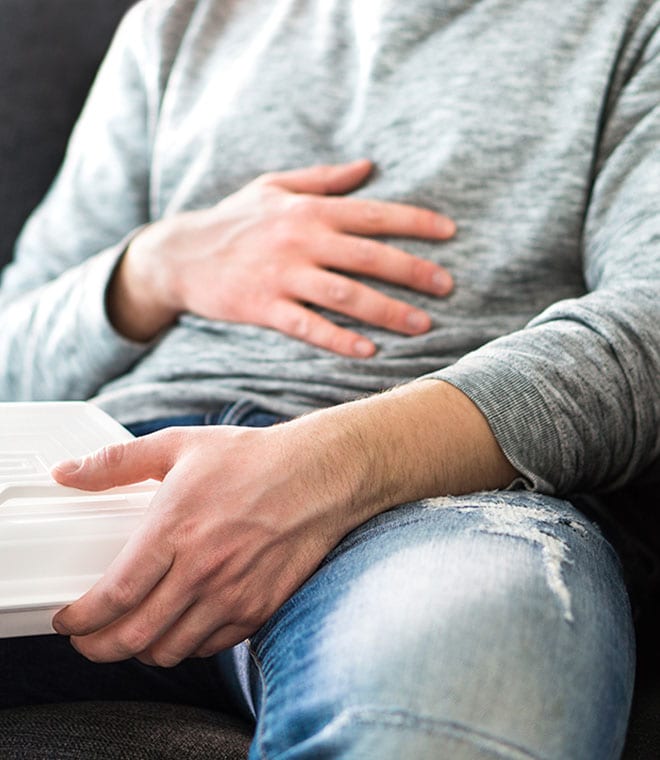Health
How to manage IBS symptoms
By Benjamin Renelus, MD, Gastroenterologist Dec 23, 2024 • 8 min
Approximately 10% to 15% of adults in the U.S. have irritable bowel syndrome (IBS). If you have IBS, treatments and lifestyle changes can help you manage symptoms, such as abdominal pain, gas, bloating, constipation and diarrhea.
1. Low FODMAP diet: Some people with IBS may benefit from reducing their intake of foods that contain fermentable oligosaccharides, disaccharides, monosaccharides and polyol carbohydrates (FODMAPs), which can be difficult to digest. Examples of foods that are high in FODMAPs include:
- Apples
- Apricots
- Artichokes
- Asparagus
- Blackberries
- Beans
- Cashews
- Cauliflower
- Cherries
- Most dairy products
- Garlic
- High-fructose corn syrup
- Honey
- Lentils
- Mango
- Mushrooms
- Onions
- Nectarines
- Pears
- Pistachios
- Plums
- Rye
- Sugar alcohols
- Sugar snap peas
- Watermelon
- Wheat
Your healthcare provider may recommend that you temporarily follow a FODMAP-restricted diet to see if your symptoms improve. This diet typically begins with an elimination phase, where you stop eating all high-FODMAP foods for about two to six weeks. If your symptoms do not improve during this time, your provider will likely have you discontinue the diet since it might be that your IBS symptoms are not sensitive to FODMAPs.
If your symptoms show improvement, your provider will typically have you move onto the reintroduction phase of the diet. This involves adding one category of FODMAP foods back into your diet one at a time and increasing the portion size over a few days to see if you experience increased IBS symptoms. Your healthcare provider will likely advise you to avoid that food if you do.
Before moving on and testing another FODMAP food category, you’ll likely be told to spend a few days back on a high-FODMAP elimination diet to ensure no crossover effects between categories. Once you identify which FODMAPs you can tolerate and which trigger your symptoms, you and your healthcare provider can put together a sustainable, nutritious diet plan that you can follow for the long term or until retesting is needed.
2. Other dietary changes: The low-FODMAP diet is just one approach to modifying your diet that may be a part of your IBS management plan. Your healthcare provider may advise you to make some of the following changes instead of or alongside reducing your intake of certain FODMAPs:
- Increasing dietary fiber: If you experience IBS with constipation (IBS-C), increasing your soluble fiber intake either by adding certain foods to the diet or using fiber supplements may lead to more regular bowel movements. Beans, fruit and oats are good sources of soluble fiber.
- Avoiding gluten: A protein found in wheat, rye and barley, gluten can cause gastrointestinal symptoms in some people with IBS. Your healthcare provider may recommend temporarily removing gluten from your diet to see if your symptoms improve.
- Drinking more water: Increasing your water intake can promote bowel regularity if you suffer from constipation. It can also reduce the risk of dehydration associated with frequent diarrhea.
- Avoiding dairy products: Some people with IBS also have lactose intolerance, which occurs when the digestive system can’t break down lactose sugar in milk and other dairy products. Your healthcare provider may recommend temporarily removing dairy products from your diet to see if your symptoms improve.
It’s important to note that IBS food triggers can be highly individualized, and what works for one person may not work for another. Working with your healthcare provider or a registered dietitian can provide personalized guidance and support in identifying and managing dietary triggers.
3. Lifestyle changes: In addition to modifying your diet, you may benefit from making other changes to your lifestyle, such as:
- Exercising regularly
- Quitting smoking
- Managing stress
- Getting enough sleep
- Sticking to a daily routine with set times for waking up, going to bed and having meals
4. Symptom-specific medications: Your healthcare provider may prescribe medications to treat specific IBS symptoms. Examples of symptom-specific drugs for IBS include:
- Anticholinergic medications: Medications, such as dicyclomine (Bentyl), can reduce cramping associated with IBS. These medications may also help with diarrhea in some cases.
- Anti-diarrheals: Available in over-the-counter and prescription-strength forms, these drugs slow down the movement of food through the digestive system to reduce diarrhea.
- Laxatives: Prescription and over-the-counter laxatives may be used to treat constipation.
- Tricyclic antidepressants (TCAs): A class of antidepressants, TCAs, such as imipramine (Tofranil), desipramine (Norpramin) and nortriptyline (Pamelor), act on nerves that control the digestive system. They are sometimes prescribed to treat pain and diarrhea caused by IBS. TCAs may cause constipation and are predominantly used for IBS-D (IBS with diarrhea).
- Selective serotonin reuptake inhibitor (SSRI) antidepressants: Although typically prescribed for depression, SSRIs, such as fluoxetine (Prozac) and paroxetine (Paxil), may ease pain and constipation associated with IBS.
5. IBS medications: The FDA has approved some medications specifically for treating IBS. They include:
- Alosetron (Lotronex): This medication, approved for use by women only, relaxes the colon and slows down the movement of food to treat IBS with diarrhea (IBS-D).
- Eluxadoline (Viberzi): Another medication for IBS-D, this drug reduces muscle activity and fluid secretion in the intestines.
- Rifaximin (Xifaxan): This antibiotic fights bacterial growth to treat diarrhea. It is only recommended for those with IBS-D.
- Lubiprostone (Amitiza): This drug, approved for treating women with IBS-C, increases the amount of fluid secreted by the intestines to make stool easier to pass.
- Linaclotide (Linzess): Another treatment option for IBS-C, this medication causes fluid secretion to increase.
- Plecanatide (Trulance): This medication softens stool to treat IBS-C.
- Tenapanor (Ibsrela): This medication is used to treat IBS-C in adults.
6. Complementary interventions: Healthcare providers may recommend complementary therapies for some people with IBS. These include:
- Biofeedback: This type of therapy can help you learn to recognize changes in your body that occur when you experience certain IBS symptoms. You can then learn ways to modify your body position, environment and other factors to potentially ease symptoms.
- Cognitive behavioral therapy (CBT): Administered by mental health professionals, CBT can help you change thought patterns to help you manage stress and better cope with IBS symptoms.
- Hypnotherapy: During this therapy, a certified hypnotherapist helps you enter a deeply relaxed state and then makes suggestions that may help you modify behaviors and manage stress.
Updated December 2024.
Sources:
- https://www.niddk.nih.gov/health-information/digestive-diseases/irritable-bowel-syndrome/treatment
- https://www.niddk.nih.gov/health-information/digestive-diseases/irritable-bowel-syndrome/eating-diet-nutrition
- https://www.ncbi.nlm.nih.gov/books/NBK555893/
- https://medlineplus.gov/ency/article/000246.htm
- https://my.clevelandclinic.org/health/diseases/4342-irritable-bowel-syndrome-ibs
- https://my.clevelandclinic.org/health/treatments/22466-low-fodmap-diet
- https://my.clevelandclinic.org/health/treatments/22676-hypnosis
- https://my.clevelandclinic.org/health/treatments/13354-biofeedback
- https://www.mayoclinic.org/diseases-conditions/irritable-bowel-syndrome/diagnosis-treatment/drc-20360064
- https://journals.lww.com/ajg/Fulltext/2021/01000/ACG_Clinical_Guideline__Management_of_Irritable.11.aspx
- https://www.monashfodmap.com/ibs-central/i-have-ibs/starting-the-low-fodmap-diet/
- https://aboutibs.org/treatment/medications-for-ibs/




